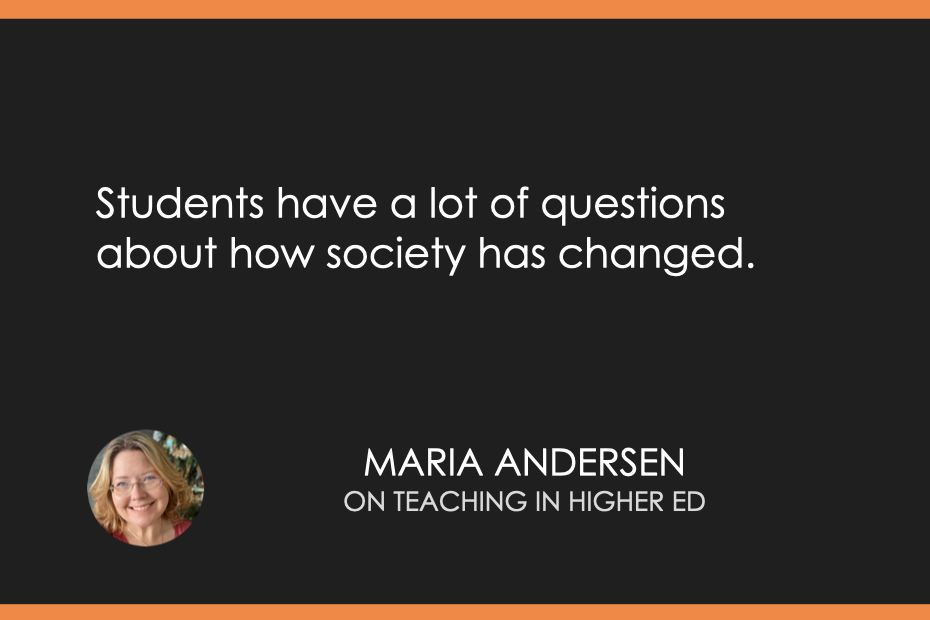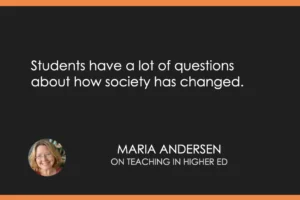
Recently, I was interviewed on Episode 469 of the Teaching in Higher Ed podcast.
Bonni and I discussed the use of video-based curriculum in material sciences, active learning sets, and the importance of teaching skills for future generations. In addition, the episode covers recommendations for technologies like Chat GPT and practical methods for screening YouTube videos, misinformation online, and the bias in Google search results. This episode also includes insights into my teaching experiences with K-12 students and the interesting subject area of technology and its history.

Here is my favorite excerpt from the interview…
Student Surprises about Technology
Bonni: What’s been some of the biggest surprises for you, as some of this was new for you and also for the students, what life looked like without the technology that we have today that perhaps we take for granted?
Maria: That’s a good question. I think the biggest surprise for the students was discovering that we have had some environmental issues that we solved, so the Montreal Protocol which ended the production of CFCs that produce the ozone hole. I think we finally, as of last year, the year before, have finally a reducing ozone hole, because it takes decades for the stuff to get out of the atmosphere.
Recently, when we did material sciences, seeing how much devastation of the forests we have created in the 1700s and 1800s, and then the turnaround of that in the last 100 years to where we now have more trees planted than are used in the United States, and we managed the use of wood and wood products so that we don’t deplete forest anymore. They were really heartened by hearing those stories. I don’t think that our youngest generations now hear a lot of stories of hope, renewal, or ones where humans have managed to solve problems. I think they’ve been most heartened and delighted by those kinds of stories.
For myself, I think it’s just this reflection on just how complex and fragile the society we live in is, and how easily it can all fall apart with one or two components of our technology chain failing. I don’t think that most adults realize just how fragile and complex it is. If you just look at– We did a unit on transportation infrastructure and we went all the way up through modern infrastructure, like how is it that an Amazon package gets to you, or overnight shipping works, or international cargo ships.
Just looking at all of those pieces individually and how they all work together to get the things to your house that you asked for, it’s just incredible, and it relies on a global infrastructure and transportation infrastructure and computational infrastructure, and just all these things that I think that we don’t learn about so much in school.
We learn pure sciences, we learn reading and writing, and we learn about now how businesses function and things like that, but we don’t spend a lot of time in school learning about how complex everything is. That is really the natural world to kids now. Their natural world is this technological world, and they should be taught about how everything is reliant on everything else.
It would make them more informed citizens, it would make them more careful voters, it would make them pay more attention to the kinds of government projects that are going on around them that keep them drinking clean water and having power in their houses and things like that. I think it’s the missing curriculum that should be taught everywhere.
Of course, I’m a little biased because I teach it, but I do see that their curiosity is peaked. They are eager to learn about the science behind everything, they have lots of questions about how society changed. We’ve had some really great and deep conversations about women’s rights, equal rights, and unions because they’ve been so shocked by things they saw in the past, like people walking across the– we were doing steel, so they were watching people walk across the steel beams and skyscrapers, in a reenactment.
They were like, “Whoa. Pause. Where’s their safety equipment?” [laughs] There was no safety equipment back then, but there are laws about this. There are laws now about this. [laughs] It was just completely unsafe, why would people have done it? Just this disbelief and now they’re starting to understand that all of the things we have today came about because people did something in the past, right?
I know we teach history, we teach social studies, and we teach humanities, but we teach it in a purist way where we study the societies. Technology has been such a driving force in society for the last 200 years, such a driving force. We have made more technological progress in the last 200 years than in all of human history.
I’m afraid that what we teach mostly in schools is the human history that goes from the 1800s to the past, not necessarily– If we made 100 times the progress in the last 200 years than we made in all of human history, shouldn’t we at least place an equal emphasis on this last 200 years of progress as we do the rest of human history? Because it’s not equal. The amount of change is incredible.
Now what we’re seeing with Generative AI, we have another incredible acceleration of change happening already. Education has had a really hard time adjusting to the last 100 years. I’ve been looking back at curriculum and education as its own technology arc, and what’s incredible to me is that we treat modern education as this thing we’ve figured out, like it’s a done deal, we know how to do this, the US has the best higher education system in the world, blah, blah, blah, except that if you go back to 1900, only 51% of elementary-aged kids went to school and only 11% of high school-aged kids went to school. That was 120 years ago.
This whole phenomenon of putting 14 to 18-year-olds in school is a very recent phenomenon. For us to imagine we have it figured out, and that the schedule of going to eight classes a day is totally the way to do it, and that what we’re teaching them is the right stuff to be teaching them is ludicrous.
We’ve only been doing it for not even 100 years, and we don’t have it figured out, and the world has changed so much in the last 100 years that we really need to do some serious thinking about what is right for teenagers to be doing in the educational system and what is right for the society to provide to them as they mature, and these things are not easy to change.



